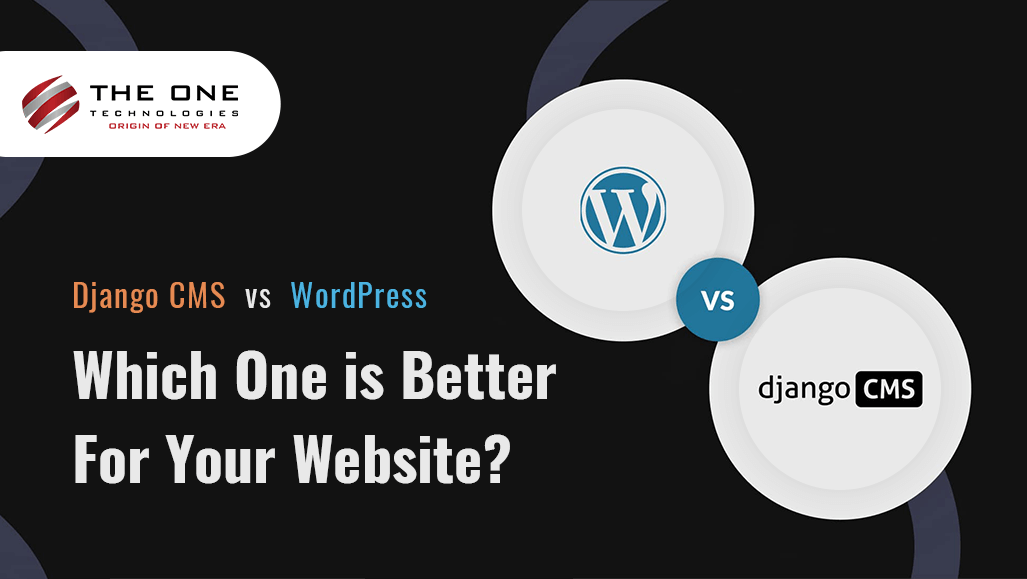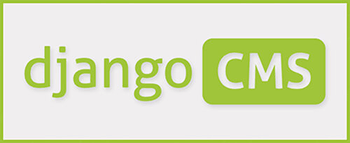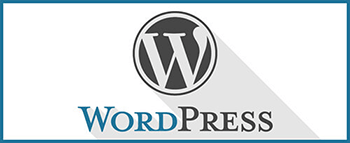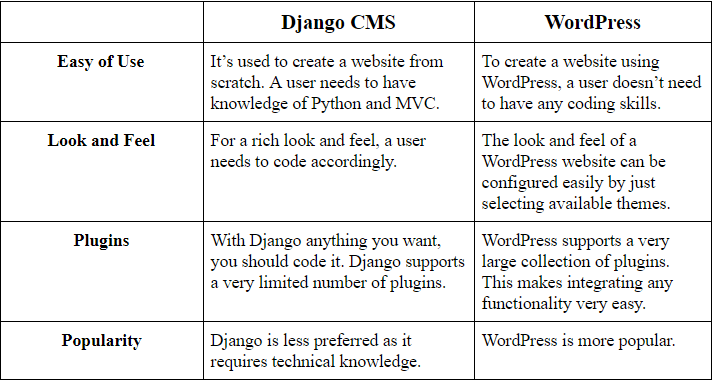Django CMS Vs WordPress - Which One is Better For Your Website?

Choosing the right platform for your website development is a huge decision before making any investment. Both WordPress and Django are popular and have their own benefits for app development. They made versatile CMS platforms that make website design and development easier. But the question is, which one is right for you?
When you are planning to develop your web development project, your first step would be to choose the right platform and tools for your website. Many of our clients come to us at this stage, seeking advice on how to choose the perfect tool. And that’s an important one: once you invest your money and time in a particular platform, the cost to switch later may be high. But you have to make sure that you have all the information before you step into any web development.
Nowadays, there are several options available in the market to consider to helping you get that site off the ground. With the advent of the now popular Content Management Systems (CMS) such as WordPress and Ghost, it has become much easier to manage your website. And that is why millions of websites on the internet are developed from WordPress. But before considering WordPress as your CMS tool, you should be also aware of other tools like Django CMS. Well, these tools are widely used in the world of web development.
Before we proceed, let us clarify that Django and WordPress are free and open-source platforms that can be used. Django is a web framework, whereas WordPress is a Content Management System.
To make things easier for you, we are here to make a comparison between the popular WordPress CMS and the powerful Django CMS.
Table of Contents
- What is Django CMS?
- Why Django?
- Features of Django CMS
- When to Use Django CMS?
- What is WordPress?
- Why Use WordPress?
- When to Use WordPress?
- Head to Head Comparison Between Django CMS Vs WordPress
- Django CMS or WordPress: Which One is Better For Your Website?
- Migration and Transition
- FAQs
What is Django CMS?

Django is one of the most popular open-source tools in web development. Django CMS is similar to WordPress, a Content Management System that is used by thousands of websites and organizations. It’s a powerful framework that is built using Python language. Django CMS is used by NASA and L’Oreal Men expert companies.
Django is a very popular CMS that was created in Python. It is the developer's favorite as it lets you customize content from the front of their website. No login panel is required from the admin side to edit or update your website.
Also, if you are planning to make one such CMS, you don't have to learn the Python language.
It allows developers to customize the content from the front of your website. This is the beauty of the Django CMS. For that, you don’t need to open an admin page. Since it's an open-source framework, it allows for improvements for everyone.
Divio is the company that actively invests in Django CMS. Several developers working on Django CMS who can work at the CMS from Divio, alongside the group of voluntary developers around the world.
Why Django?
Django was first introduced in 2005 as a Python solution to build a newsletter site along with an open-source project. It is the most-used Python library for web development, with almost 7 million downloads per month.
When to Use Django CMS?
There are several reasons which help developers to choose Django CMS over WordPress. Let us give you some of these reasons here. If you need to enable some features for your project that you cannot easily find on the internet, or no WordPress theme offers the same functionalities, then Django is the best choice to develop such a project.
Features of Django CMS:
Fast: With Django, you can develop your website very fast, from ideas to production in the shortest possible time. It can be possible with the help of ready-made libraries such as ORM for database models.
Security: Django ensures that the developers don’t make silly security mistakes.
Scalable: The Django project consists of small pluggable applications. All these applications are easily plugged into the main project.
Versatile: Django is a versatile framework that allows developers to develop any type of website from eCommerce to social media platforms to scientific websites.
Rapid Prototyping: It enables swift and efficient development of website prototypes, allowing users to quickly iterate and visualize their ideas before full implementation.
Highly Customizable Features: It empowers users to tailor content structures, templates, and functionality to suit diverse project requirements with flexibility and ease.
Scalable Architecture: It facilitates seamless expansion and growth, ensuring optimal performance as websites and applications evolve in size and complexity.
High Security: It provides robust built-in defenses and best practices to safeguard web applications against potential vulnerabilities and unauthorized access.
Unique Validation of Data: It ensures the integrity and accuracy of content through comprehensive validation processes, enhancing overall data quality and reliability.
Custom User Permissions: It empowers administrators to finely control access levels, ensuring a tailored and secure content management experience for diverse user roles.
Open-source: Django is a free and open-source web framework that anyone can develop web applications faster.
Extensible: Developers will get all the power of the pip package manager, so anyone can install available Django apps such as the Django REST framework to develop REST APIs.
Default features: Django has all the required functionality to create a complex web application. So, suppose you want to develop a database-based application. In that case, it has database schemas, model user interactivity, and helps you design an attractive UI from models and migrations.
With Django, you can build these given websites:
> E-Commerce
> Directories
> Scientific web systems
> Banking systems
What is WordPress?
WordPress is an open-source and the most popular content management system, written in PHP and MySQL. Big companies like The Next Web, Techcrunch, and Frankwatching are using WordPress.
WordPress is a CMS platform and is popular for its no coding requirement. It offers highly customized applications with less effort, and developers don't have to give much time to learning. WordPress is flexible and has become the most popular CMS on the market, with a market share that exceeds 40%.
If you are using WordPress, it allows you to add or install themes, plugins, and widgets easily to the page. You can find plenty of plugins on the internet that you can think of. This is a way you can set up a WordPress website with great ease. Some of them are free, while others charge a relatively small amount while providing impressive interface and features.
By adding these themes and plugins, you can make your website user-friendly. You don’t need to be a pro-developer if you are planning to build a website using WordPress. WordPress provides single-click support for the majority of web hosting services. This is the reason many have named it as a “tool for amateurs”.
Just like Django CMS, WordPress also has a team that actively invests in the system, in addition to a group of volunteers.
Why Use WordPress?
In case, you have chosen to adapt WordPress for your web development, here are the reasons why many developers have started using WordPress over other options.
> It’s free and open-source
> Takes less time to develop a complete website
> Easy to use and customize
> Affordable plugins
> Easy to deploy a live website to a shared hosting server
When to Use WordPress?
If you are new to web development and wish to develop a new project, then WordPress is the ideal choice. However, if you are also

familiar with HTML, CSS, and other web designing tools and languages, WordPress is the best for you.
Features of WordPress:
Easy to Customize: It allows users to effortlessly personalize themes, plugins, and content, making it adaptable to diverse design and functionality preferences.
User-friendly: It makes website creation and management accessible to individuals with varying technical expertise through an intuitive and easy-to-navigate platform.
Simple use cases and no complicated features: WordPress excels in simplicity for straightforward use cases, providing an uncomplicated platform without unnecessary complexities, ideal for users seeking straightforward website functionality.
Free and Open source: Similar to Django, WordPress is also a free and open-source CMS that makes helps to develop the website and anyone using its source code.
Versatility: As a popular CMS, with WordPress, you can make attractive and user-friendly websites.
Huge MarketShare: Currently, WordPress is functioning great and covers over 40% of the internet.
Extensibility: It has a whole suite of paid as well as free plugins to use in website development.
Any developer with no deep knowledge of web development, he can also create an amazing website by using WordPress from scratch.
With WordPress, you can build these given websites:
> Company website
> Blog
> Personal Website
> Portfolio
> Small e-commerce site
Head to Head Comparison Between Django CMS Vs WordPress
Django is a web framework that is used by developers to power websites and build them from scratch. On the other hand, WordPress is a free content management system that is used by many developers. It has a great dashboard and community support.
However, it completely depends on your needs and requirements and your team’s expertise on which tool to choose for your web development project. Django CMS Vs WordPress is a dilemma many developers face when they are planning to develop a website.
Backend Web Framework vs CMS
Django is a backend framework used for websites, whereas WordPress is CMS software. When it comes to a backend framework, it is a set of tools created on top of a programming language that allows developers to build web applications from scratch. Like Django, most web frameworks don't provide ready-to-use CMS tools as a proper CMS does. You will get an API to custom-build your website with a web framework.
Compared to a CMS, web frameworks let you develop more complex features because you can develop them with code. With the help of a CMS like WordPress, if no plugin fits your needs, you have fewer possibilities to make custom features. Thus, both of them have their benefits and are used for different tasks.
Tool checking is necessary if a developer is planning to embark on any design or development of a web project.

Django CMS or WordPress: Which One is Better For Your Website?
After reading this article, you have understood that no tool or platform is the best and most suitable to develop a blog website. Django CMS and WordPress have their own perks and disadvantages. It’s completely your choice to choose as per your requirements and project features.
If you are looking to develop a professional website that reflects your brand identity, then Django CMS is the best framework option to use. Although a WordPress website can look great for a brand, a Django website can provide a much higher level of specificity to the brand message. It’s not a great tool to create a blog but is a better option for SMBs and larger businesses who want to build an extensive online presence.
If you have any idea or your business needs a website to be created in Django, then The One Technologies is the right choice to make your dream alive with expertise in this field for a decade. Being the best and leading Django Development Company, our Django Developers provide the seamless and best customer-oriented service to our clients across the globe. Hire Django Developer to fulfill your dreams now.
On the other hand, if you are working on a blog that focuses on providing high-value information within a standard architecture, then WordPress comes first then Django. The native SEO improvements, multiple plugin options, and user interface make it possible for teams to collaborate easily while setting up multiple players of security. If you are looking to develop a blog website that has plenty of information, then being the best WordPress development company, you should leverage our WordPress development service or Hire WordPress Developers.
Obviously, you will find certain bugs and drawbacks within the WordPress system, but the benefits often outweigh the negatives. You can be productive and get your information out there, even if it might be a little overkill for smaller sites.
Migration and Transition
Let's explore the details of migrating and transitioning between Django CMS and WordPress.
Converting to WordPress from Django CMS
It's important to properly prepare the transfer from Django CMS to WordPress, as it can be a big decision. The essential actions and ideas are listed below:
Evaluation
To start, evaluate your current Django CMS website. Recognize the layout, information, and features of your website. You can decide what needs to be migrated with the help of this assessment.
Content Transfer
Moving your content is the most important step in the transfer process. Text, pictures, video, and other media are all included in this. You may need to export your material from Django CMS in a format that WordPress can import. This frequently entails transforming the data into a compatible format, such as XML or CSV.
Plugins and Functionality
Determine the features and functionality of your Django CMS site and look for comparable WordPress plugins or solutions. Since WordPress has a sizable plugin library, you ought to be able to find substitutes for most functionality.
URL Mapping
Pay great attention to the URL structure of your website. You should set up redirects if URLs change throughout the migration to make sure that users who access the old URLs are forwarded to the matching new ones. For both user experience and SEO, this is essential.
Data Backup
Before beginning the migration procedure, always make a backup of your data. In case, if something goes wrong during the transfer, you will have a safety net, thanks to this.
Testing
Test your WordPress website carefully after the migration to make sure that all of the content, functionality, and design aspects perform as they should. Address any problems right away.
Launch and Monitoring
Once you are happy with the WordPress site, you can launch it. Keep an eye on the site's performance, and deal with any problems right away after launch.
Considerations for SEO
To make sure that your website's SEO rating is maintained or increased, update your SEO settings, and submit a fresh sitemap to search engines.
Moving to Django CMS from WordPress:
A smart choice would be to switch from WordPress to Django CMS, particularly if you require more flexibility and customization for your website. How to do it is as follows:
Content Import
Starting with an assessment of your current WordPress website. Recognize its layout, information, and the plugins and themes you're utilizing. Decide regarding what must be migrated and what can be left behind.
Content Migration
Exporting your content from WordPress in a format that is compatible with Django CMS is similar tolike transferring from Django CMS to WordPress. Watch out for accurate transmission of text, media, and other content elements.
Installation of Django CMS
Install and configure Django CMS in your hosting environment. Set up the database options and other necessary configurations as needed to meet your needs.
Assessment
Use the Django CMS scripts or tools to import the content from your exported WordPress files. Depending on how the two platforms' data structures differ, this can call for some data transformation and mapping.
Design and Template Creation
Create designs and templates for your Django CMS website or modify existing ones. In this aspect, Django CMS offers a great level of versatility by enabling the creation of unique themes and layouts.
Functionality Integration
Replace any WordPress-based website functionality with Django CMS plugins, custom code, or third-party integrations. A strong ecosystem exists for adding features to Django CMS.
Testing
Test your Django CMS website thoroughly to make sure that all of the content, functionality, and design aspects are functioning as intended. Address any problems that develop while testing.
SEO and URL Mapping
To provide a seamless transition for visitors and search engines, implement suitable SEO settings and set up URL redirects if your URL structure changes during migration.
Launch and Monitoring
You can launch the Django CMS website after you're satisfied with it. Maintain constant site performance monitoring and take care of any post-launch problems.
Training and Upkeep
Ensure your team has received the training to administer and maintain the Django CMS website efficiently. Update and maintain the CMS regularly.
Remember that both migrations require meticulous preparation, testing, and attention to detail to guarantee a smooth transfer. Your website's unique requirements and long-term objectives should be considered when deciding whether to switch from Django CMS to WordPress or vice versa.
FAQs
1. What is Django CMS?
Django CMS is a free and open-source content management system based on the Django web framework. It offers a scalable and customizable platform for building websites, especially those requiring complex features and functionality.
2. What is WordPress?
WordPress is also a free and open-source content management system, but it is more popularly known for its simplicity and user-friendliness. It powers millions of websites worldwide and offers a wide range of themes, plugins, and templates.
3. Which one is better for beginners: Django CMS or WordPress?
For beginners who are new to web development, WordPress may be more suitable due to its intuitive interface and vast community support. Django CMS requires some level of programming knowledge and familiarity with the Django framework.
4. Can Django CMS handle large-scale websites with heavy traffic?
Yes, Django CMS is highly scalable and can handle large-scale websites with heavy traffic efficiently. Its modular architecture allows developers to build complex websites with ease.
5. Is WordPress capable of handling advanced website functionalities?
While WordPress started as a blogging platform, it has evolved into a robust content management system that can handle advanced website functionalities through various plugins and customizations.
6. Which platform offers better security measures: Django CMS or WordPress?
Both platforms have strong security measures in place, but Django CMS has an advantage due to its emphasis on secure coding practices by default. However, overall security depends on how well the website is implemented and maintained.
7. Can I easily migrate from WordPress to Django CMS or vice versa?
Migrating from one platform to another can be challenging as both systems have different structures. However, there are tools available that can assist in migrating content between the two platforms if needed.
8. Which platform provides better SEO capabilities: Django CMS or WordPress?
Both platforms offer solid SEO capabilities; however, WordPress excels in this area due to its extensive range of SEO plugins like Yoast SEO. Django CMS requires more manual configuration but still provides the necessary tools for optimizing websites for search engines.









